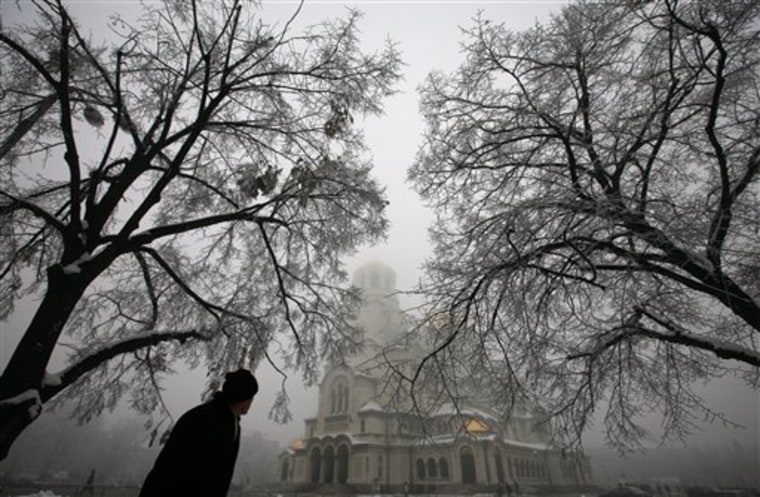Aleksa Branisavljevic's apartment is freezing, but his anger toward Russia burns hot.
His every breath a visible plume, the elderly Belgrade resident railed against Moscow on Monday for a standoff with Ukraine that has shut off natural gas supplies to millions of eastern Europeans.
"Russians always gave us nothing but misery. They should never be trusted, as this gas blackmail of Europe shows," Branisavljevic said.
Mingled with the misery is a sense of betrayal in nations such as Serbia and Bulgaria — which have traditional religious and cultural ties to Russia, but a complicated love-hate relationship with the Kremlin.
Just last month, Serbia sold its state oil monopoly NIS to Russian gas giant Gazprom at a discount. Serbian officials were convinced the payoff would be steady fuel supplies. But Gazprom halted gas delivery via Ukraine last Wednesday amid a price dispute.
Serbs outraged
Serbs outraged as temperatures plummeted inside their homes burned a Russian flag in protest Monday and the Serbian government sought emergency supplies from Hungary and Germany.
Overall, the 27-nation European Union relies on Russia for a fifth of its total energy needs and the gas cutoff has affected more than 15 countries. But eastern members, including Bulgaria and Romania, are much more dependent on Moscow for fuel.
Bulgaria, a former Soviet satellite that is now the poorest member of the EU, relies almost entirely on natural gas from its former Cold War masters.
Bulgarians have braved subfreezing temperatures and struggled to stay warm in unheated homes, schools, kindergartens and offices for nearly a week — and anger is mounting.
"People are fed up with thinking globally but freezing locally," said Valeri Naidenov, a newspaper columnist.
In Hungary, which endured decades of Soviet domination and occupation, Budapest issued its first-ever smog alert Sunday, blaming the badly polluted air partly on power plants that switched to dirtier oil after gas shipments were suspended.
Gazprom announced Monday it would resume shipping natural gas to Europe early Tuesday "if there are no obstacles," said the deputy chairman of the monopoly, Alexander Medvedev.
Bickering continues
But relief will not come immediately. Russia and Ukraine are still bickering over who should pay for the gas Ukraine needs to power the compressors that push Europe-bound gas through its pipelines. And once Russia resumes pumping, it will take another 24 to 30 hours for gas to reach European customers, EU Energy Commissioner Andris Piebalgs said.
The announcement came after Ukraine signed off on an EU-brokered deal that sent teams of EU, Russian and Ukrainian monitors in to track the movement of Russian gas through Ukraine's vast pipeline system. Gazprom has accused Ukraine of siphoning off gas intended for Europe, a charge Ukraine denies.
No gas will be sent to Ukraine for domestic use until the neighbors resolve their deadlock over how much Ukraine should pay for gas in 2009 and the amount Russia will be charged for transporting gas through Ukraine's pipelines. Russia stopped supplying gas to Ukraine on Jan. 1 over the dispute.
In Romania, another impoverished EU newcomer, leaders have urged exploration of alternatives to Russian gas. Romania gets about 30 percent of its energy from Russia — not nearly as much as Bulgaria, but enough to create hardship.
"The Russians are at the root of everything bad that happens in Romania," said David Pop, 47, who recently returned from a construction job in Spain.
"They were and they remain wheeler-dealers," he said. "We should be more cunning than them and take more gas than we need and store it somewhere, because they will do this again whenever they feel like flexing their muscles."
In Bosnia-Herzegovina, frustrated residents circulated cell phone text messages disparaging Russia. Some have spent money they really couldn't afford on electric heating after temperatures plunged below 7 degrees in Sarajevo.
"We switched our heating from gas to electricity," said Snjezana Kordic, a 51-year-old Sarajevan. "We will never again depend on the mood of the Russians."
